-
Interview with Professor Julian Kinderlerer “On ethics, trust and responsible R&I”

During the SATORI Final Conference, held from 18-19 September 2017, in Brussels Belgium, in a short interview Emeritus Professor of Intellectual Property Law from the University of Cape Town, talked about research ethics, why it is so important topic, responsibility…
-
SATORI in NATURE

SATORI mentioned in NATURE article on guidelines for internet research
-
Genome Editing and the ethics of risk. When is a risk morally acceptable or not?

By Dino Trescher, EUSJA Science and Technology are part of the daily modern life and impact on most human beings, both in the developed and developing world. As the French philosopher and sociologist Bruno Latour argues: “Technology is society made…
-
More than 140 participants at the SATORI Final Conference

More than 140 participants and high-level EU officials at the SATORI project conference in Brussels discussed the future trends in ethics of R&I
-
Travel Grant Winners

The SATORI project has run a travel grant scheme for young scholars in the run-up to the Final conference as part of commitment to the promotion and encouragement of early career scholars in the areas of ethics assessment and ethical…
-
SATORI Publications list
Brey, Philip, Clare Shelley-Egan, Rowena Rodrigues, Philip Jansen, “The Ethical Assessment of Research and Innovation – A Reflection on the State of the Art (Based on Findings of the SATORI Project)”, in Ron Iphofen FAcSS (ed.) Finding Common Ground: Consensus in…
-
Draft: Key policy recommendations SATORI

The SATORI draft of its key policy recommendations is available.
-
Conference Programme Available for download

The conference programme for the final SATORI conference is now available in PDF form for download here: Download Programme (PDF)
-
Industry and research and innovation (R&I): Towards ethical, reponsible and sustainable R&I

This policy brief discusses implications and suggests to policy-makers how to improve the design of deployment policies and navigates businesses in policy-induced markets, and provides tools to help policy-makers and industry to foster ethical, responsible and sustainable R&I in industry, namely ethics assessment (EA) and ethical impact assessment (EIA) of R&I.
-
First international ethics assessment pre-standard for R&I

The first ISO-compliant international standard document for ethics committees and for anticipating and ethically assessing social and environmental consequences of research and innovation.
-
Ethical Impact Assessment – enhancing responsible research & innovation

Who is it for: Policy-makers, research organisations, policy advisors, government research and innovation (R&I) departments interested in ethical impacts of research and innovation, private companies, R&I departments, national ethics committees,
research ethics committees, researchers. -
Supporting ethics assessment in research and innovation

Ensuring that R&I follows high ethical standards by reliable and efficient assessment procedures requires well-functioning national systems of ethics assessment based on internationally harmonised principles, which also facilitate international research collaboration.
-
Maximising the potential of Ethics Assessment of Research & Innovation: a call to Research Funding Organisations

This policy brief focuses on Research Funding Organisations (RFOs). RFOs, especially the European Commission, through their various funding programmes have a major leverage effect on how ethics is addressed in research and innovation. Ethics assessment at the European Union and Member States level has existed for decades in the field of clinical trials on drugs and medical devices. However, this has not been the case in other fields of research and innovation (R&I).
-
Registration for the SATORI Final conference is now closed

The conference will present and discuss state-of-the-art developments in research ethics assessment and the ethics of technological innovation. It will feature leading ethicists, researchers, innovators, and representatives from policy organisations, research funding organisations, industry, civil society, science media, and academia.
-
CWA Part 2 released

About the CWA The research results from work packages 1 and 4 have been used as the basis for a CEN Workshop Agreement (CWA). Existing procedures and best practices in ethics assessment were translated into a practical tool to implement…
-
Call for travel grant applications

SATORI Final Conference ETHICS ASSESSMENT OF RESEARCH AND INNOVATION: LOOKING TO THE FUTURE September 18-19, 2017 MCE Conference & Business Centre Rue de l’Aqueduc 118, Brussels, Belgium The SATORI project, aimed at the advancement of ethics assessment of research and…
-
We need your support to continue dialogue on ethics assessment in R&I

From 2014-17, the SATORI project has facilitated multi-stakeholder dialogue and cooperation, which has produced: extensive mapping of ethics assessment procedures and practices in multiple fields and sectors a proposal for a common European ethics assessment framework an early-stage standard for…
-
CWA part 1 released

CWA Part 1 makes recommendations for the composition, role, functioning and procedures of ethics committee. Organisations can use part 1 to strengthen and/or improve the ethics assessment of their research and innovation projects. Ethics committees include, but are not limited to, research ethics committees, institutional review boards, ethical review committees, ethics boards, and units consisting of one or more ethics officers. Part 1 of the CWA is applicable to all ethics committees, regardless of their size, scope or research and innovation area.
-
How ethical is EU science?

The SATORI consortium has developed an ethics assessment Framework of R&I for European Union member states.
-
(VIDEO) What does the SATORI Framework offer?
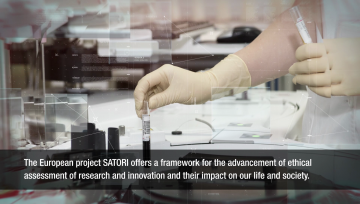
SATORI is a platform for the consolidation and advancement of ethical assessment in research and innovation. The 4-year project aims to develop a common framework of ethical principles and practical approaches so as to strengthen shared understandings among actors involved…
-
17 goals to change the world
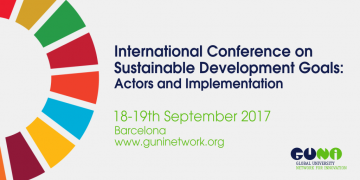
International Conference on Sustainable Development Goals: Actors and Implementation
-
SATORI panel: 3rd European Technology Assessment Conference
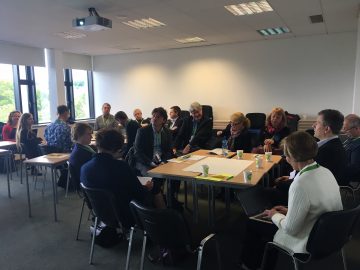
SATORI partners participated in the 3rd European Technology Assessment Conference that was held in Cork between 17 and 19 May 2017. Philip Brey (UT), Agata Gurzawska (UT), Marlou Blijsma (NEN), Raija Koivisto (VTT) and Zuzanna Warso (HFHR) organized a panel…
-
SATORI Newsletter April 2017
Catch up on the latest news on the revised European code of conduct for research integrity, RRI in the health industry, responsible innovation, precautionary principle and quality of life: new guidance developed in Italy, green light for the creation of…
-
Meet SATORIAN Profiles

The SATORI Project is performed by people with skill, engagement and ethics in mind Meet some of them HERE…
-
TRUST to fight exploitation
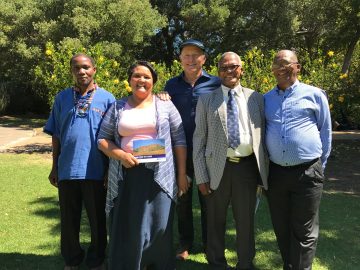
Read the latest blog post guest authored by Francesca Irene Cavallaro (UNESCO), from the TRUST project.
-
SATORI presented to Robert-Jan Smits
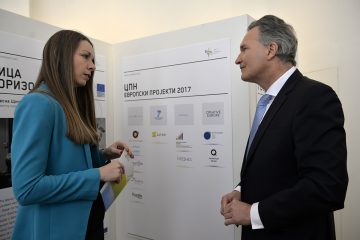
„It is important, more than ever before, to communicate about science, about impact of science and a role that science plays within society”, said Robert-Jan Smits, Director-General of DG Research and Innovation at European Commission, during his visit of the CPN exhibition “Serbia in Horizon 2020”
-
ETHICS ASSESSMENT IN RESEARCH & INNOVATION: POLICY ENCOUNTERS
SATORI will host a policy workshop in Brussels on 23 May 2017 to discuss: ethics assessment policy recommendations and means to foster their sustainability; how policy decisions can nurture or restrict ethics in research and innovation; and views on how…
-
SATORI training Belgrade
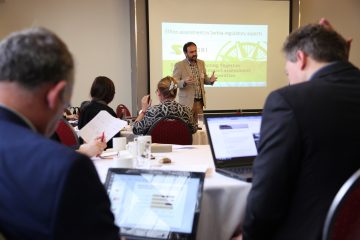
By Dalibor Petrović, Professor of Sociology, University of Belgrade, Center for the Promotion of Science associate Towards the end of November 2016 Belgrade hosted one of SATORI training sessions aimed at introducing regional ethics experts and young researchers of various…
-
SATORI Newsletter – February 2017
Catch up on the latest ethics related news across the world. Read the SATORI newsletter.
-
Postdoctoral researcher in Ethics and Governance of Research and Innovation (8 months)
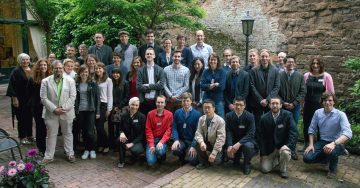
University of Twente In this postdoc, you will be working on two projects. First, you will coordinate and carry out the Ethics and Policy project, a project on making ethics research (especially ethics of technology) relevant for policy makers. This…
-
Improving the organisation of research ethics committees (RECs)

The SATORI project aims at supporting mutual learning in ethics assessment and guidance across stakeholders, and harmonising ethics assessment in Europe and beyond. Research ethics committees (RECs) form a crucial part of any framework for ethics assessment. Therefore, the SATORI project studied good practices in RECs aims, organisation and procedures across different institutions and jurisdictions. The present Policy Brief outlines our findings.
-
SATORI on Ethics in Social Sciences and Humanities
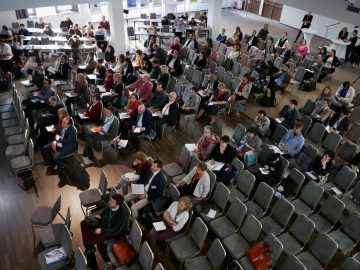
The SATORI project and its findings were presented at the conference Social sciences and humanities: a new agenda for Europe’s challenges in Bratislava on 15 and 16 November 2016. The conference, organised in the context of the Slovak presidency of…
-
SATORI features at Information Infrastructuring for Disaster Risk Management: Addressing ELSI in Information Sharing workshop
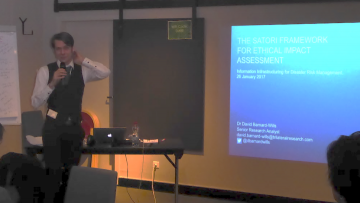
Dr David Barnard-Wills of Trilateral Research Ltd attended the Information Infrastructuring for Disaster Risk Management, jointly organised by several EU FP7 projects (SecInCoRe, EPISECC, SECTOR, and REDIRNET) in association with PSCE and the Broadmap project, the Centre for Mobilities Research,…
-
Guidelines on ethics assessment for research and innovation

To translate the SATORI research results into practical tools, a CWA (European standard) for ethics assessment and innovation is being developed. On February 1 stakeholders will meet in Ljubjana to discuss the proposal for the last time before it will…
-
SATORI Newsletter – December 2016
Catch up on the latest news on animal welfare, CIOMS guidelines, corporate social responsibility, CRISPR gene-editing, ethics and fundamental rights, healthcare ethics, human subject research, research integrity, research misconduct, the SATORI CWA, and social egg and cryogenic freezing. Read more…
-
SATORI mutual learning workshops portal
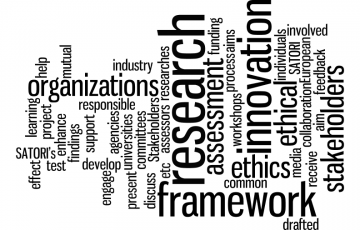
The SATORI project aims to develop a common European framework for ethical assessment of research and innovation. To this effect, in collaboration with stakeholders, it has drafted an ethics assessment framework that will help enhance and support ethical and responsible…
-
Public inquiry extended: Have your say on ethics assessment in Europe until November, 30th 2016

EU FP7 project invites you to give your feedback on the first version of the CEN (Comité Européen de Normalisation) Workshop Agreement – CWA – a document which sets requirements and provides guidelines for ethics assessment undertaken by research ethics…
-
SATORI Newsletter – October 2016
Catch up on news about algorithmic accountability, ethics in design, gender equality, genome interventions, impact of ethics officers, informatics ethics review boards, SATORI CEN Workshop Agreement, SATORI mutual learning workshops, standard for robots, transgender ethics, etc. Read more in our October…
-
SATORI discusses data protection impact assessment challenges at Brussels Privacy Hub
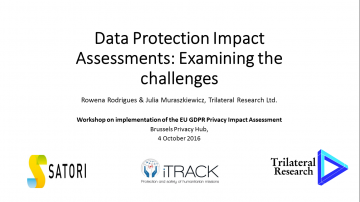
Rowena Rodrigues, Trilateral Research represented the SATORI project at the Brussels Privacy Hub Workshop on the implementation of the EU GDPR: Privacy Impact Assessments and gave a joint presentation on “Data Protection Impact Assessments (DPIAs): Examining the Challenges” on 4…
-
Have your say on ethics assessment in Europe
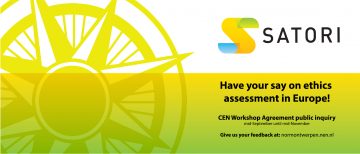
SATORI project invites you to give your feedback on the first version of the CEN Workshop Agreement
-
SATORI Newsletter – August 2016
Catch up on news about patient access to new medicines, principles of science policy making, mHealth privacy, and new ethical guidelines and Codes etc. Read more in our August newsletter.
-
SATORI in Croatia
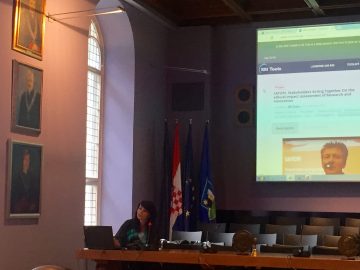
SATORI project was selected as one the inspiring practices by the RRI Tools project and it was listed as one of the tools within the RRI Toolkit on-line platform.
-
Exploring synergies: RRI Tools and SATORI
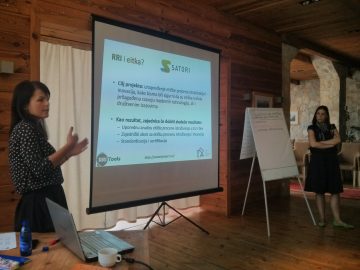
Being one of the selected tools, recognized by the RRI Tools consortium, SATORI project was also presented to the audience – main objectives and outcomes of the project. In that respect, many SATORI reports were mentioned, especially those aimed reviewing ethical assessment in selection of EU countries and those with focus on different scientific disciplines.
-
Ethics assessment in Europe: values, ethical principles and norms that matter to researchers and innovators

Should we alter human DNA in embryos using gene-editing technologies? How should we deal with issues of privacy and information-sharing in the Internet of things? Should human enhancement be for the privileged few? These sorts of questions raise ethical issues, and the way those issues are treated varies significantly across the European Union
-
SATORI Newsletter, July 2016
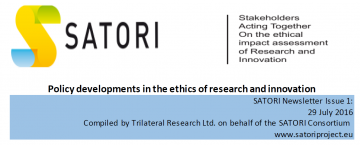
Catch up on news about animal research, telemedicine ethical guidelines, genetic modification of human embryos, gender equality, etc. Read more in our July newsletter.
-
Rossella Cardone, Ericsson (ET)

At Ericsson, I am the Head of Innovation, Sustainability & Corporate Responsibility at Ericsson for the Region Mediterranean. In my position, I lead and drive innovation and S&CR activities as well as encouraging the right conditions for creativity and innovation…
-
Signe Annette Bøgh, Danish Standards (DS)
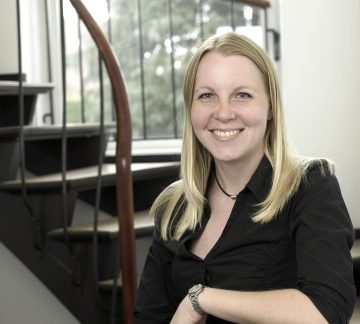
Ms. Signe Annette Boegh, consultant for education and research at Danish Standards. Signe holds a master in engineering in International Technology Management from Aalborg University. For the past four years, she has been participating in national and European research projects…
-
Ethical assessment in Serbia: between insistence and resistance
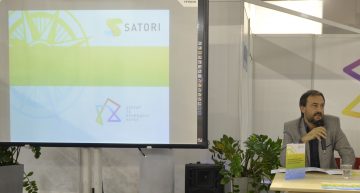
Although ethical assessment is not sufficiently rooted in Serbian institutions, certain ethical dilemmas seem to pervade the public discourse. These include constant assessments of (un)ethical behavior of various individuals, from politicians, doctors and scientists to common people and their daily moral struggles.
-
Lise Bitsch, Danish Board of Technology Foundation (DBT)

Ms. Lise BITSCH, Ph.D., senior project manager at the Danish Board of Technology Foundation (DBT). She has PhD and post-doc level research experience with social and ethical issues of techno-scientific innovations in relation to genomics, and the biobased economy. Her…
-
SATORI features at the ARMA Workshop on Managing Publication Authorship and Social Media
Rowena Rodrigues of Trilateral Research Ltd. (deputy coordinator of the SATORI project) gave a session on “Social Media Research, Security and Privacy” at the Association of Research Managers and Administrators (ARMA) Workshop on Managing Publication Authorship and Social Media held…
-
Workshop – Cost-effectiveness, risk-benefit and ethics assessment
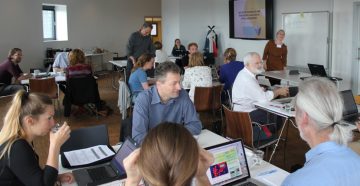
In this workshop, held May 30-31, 2016, experts, scientists and SATORI-partners worked in groups with the six case studies: Science Academies, Research Ethics Committees, National Ethics Committees, Research Funding Organisations, Industry and EU governmental level ethics review. The SATORI project…
-
SATORI expert on Serbian National Television

Dalibor Petrović, Serbian expert, talked about the main goals of the SATORI in TV
-
Zuzanna Warso, Helsinki Foundation for Human Rights (HFHR)
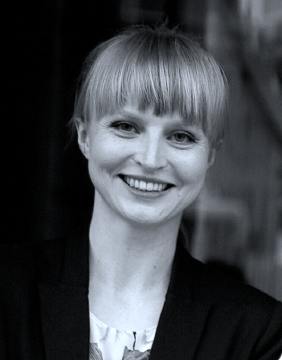
How did you become involved with the SATORI project? In 2012 I was participating in a conference in Berlin concerning privacy and emerging technologies. It was where I met prof. Philip Brey from the University of Twente and David…
-
David Wright, Trilateral Ltd. (TRI)
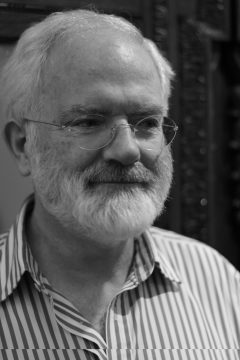
“Ethical impact assessment will make R&I more responsible!” By Rowena Rodrigues, Trilateral Research Ltd. SATORI is a 45-month European Commission-funded project, comprising 17 partners from 12 countries, including an intergovernmental organisation, the aim of which is to harmonise ethical impact…
-
Dubravka Vejnović, Center for the Promotion of Science (CPN)

Ms Dubravka Vejnović is an expert associate at the Center for the Promotion of Science, Belgrade, Serbia and a PhD candidate in human genetics. She coordinates several EU funded projects and is very interested in bioethical issues. Ms Vejnovic is…
-
Göran Collste, Centre for Applied Ethics (CTE)

I am professor of Applied Ethics at Linköping University. My research deals with problems in Ethics and Applied Ethics and my publications include books and articles on global justice, the principle of human dignity, work ethics and ethical issues related…
-
Marlou Bijlsma and Thamar Zijlstra, NEN
NEN partner in SATORI NEN is the Dutch standardization organization, national member of the CEN and ISO networks. NEN is involved in SATORI to develop a pre-standard on ethics assessment for research and innovation. We are happy to be asked…
-
Partner profiles
Behind the SATORI Project are selected and talented project managers covering a wide range of skills. Together they represent European and international companies and organisations in a united effort on the ethical impact assessment of Research and Innovation. Meet some…
-
SATORI in ELEMENTS magazine
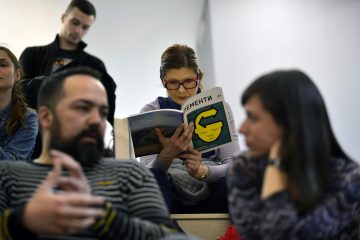
Elements, a science popular magazine from Serbia, in its spring edition dedicated a story to the main objectives and outcomes of the SATORI project. The article pays special attention to the globalization of scientific endeavour, with a reference to the…
-
COMPREHENSIVE EMPIRICAL ANALYSIS OF ETHICS PRACTICES IN THE EU
With the aim of developing a common European framework for ethical assessment of research and innovation, the SATORI project consortium has completed a comprehensive empirical analysis of ethics assessment and guidance practices related to research and innovation in the EU…
-
SATORI features in the RRI Toolkit!
The long-awaited RRI Toolkit has been launched today! The Responsible Research and Innovation Tools (RRI Tools) project has developed a digital platform, comprised of a wealth of resources that will foster not only “the best science in the world, but…
-
SATORI features in Doctoral Education Bulletin and the AfRe Newsletter!
The EUA Council for Doctoral Education’s (EUA-CDE) Doctoral Education Bulletin (Winter 2015) edition on Ethics in Doctoral Education featured an article by Rok Benčin, (Research Centre of the Slovenian Academy of Sciences and Arts), Daniela Ovadia (European Union of Science…
-
SATORI at the British Council Serbia Conference
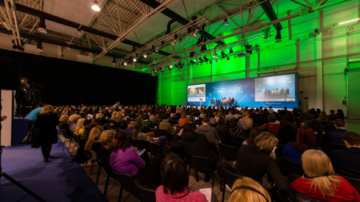
As one of the partners of the British Council Serbia Conference “New Technologies in Education 2016” Center for the Promotion of Science (CPN) is organizing a panel discussion dedicated to the concept of responsible research and innovation. Panel will be held in…
-
A common practice in ethics assessment is possible, but we need to pay attention to differences between cultures
Do differences in culture hinder harmonisation of ethics impact assessment of research and innovation? Not according to the SATORI project’ latest report! Culturaldifferences&EthicsAssessment_SATORI
-
Policy and legal options for developing research ethics within the context of globalisation

Responsible and Ethical Governance of Research and Innovation in the Context of Globalization In June 2015, consortium partners, leading authorities and experts met at a conference at UNESCO Headquarters in Paris to deliberate on the project’s findings so far and…
-
A COMPREHENSIVE PICTURE OF ETHICS ASSESSMENT IN THE EU NOW AVAILABLE!
A major report on the state of the art of ethics assessment in select EU countries, different disciplines and institutions is issued by the SATORI Project, supported by the European Commission through its FP7 funding scheme. SATORI_ETHICS ASSESSMENT IN THE…
-
Great difference in ethics assessment of scientific disciplines
Did you know that the medical sciences are the only scientific disciplines strongly governed by ethical assessment practices? In fact, ethics assessment hardly takes place in the humanities, and has only recently started to gain a stronger position in the…
-
Introducing ethics of R&I in Serbia
The Center for the Promotion of Science (CPN) is the SATORI project’s partner in Serbia. Contrary to the rest of the partners in the consortium Serbia, is not yet a full member of the EU and issues of ethics in…
-
Can we develop a standard agreement for ethics impact assessment of R&I? Join us to find out!
It has been a busy summer for the SATORI project. Following a year and a half with intense study of global ethics assessment practices, we could finally publish the results of our hard work on the website: 1 main report…
-
Ethical Impact Assessment Framework for Research and Innovation
On September 17, 2015, the SATORI partner NEN (Netherlands Standardization Institute) will host the workshop ‘Ethical Impact Assessment for Research and Innovation’. The SATORI Workshop will assess the feasibility of European consensus for such a framework. Ethical impact assessment of research and…
-
SATORI meets the (Danish) public

On June 12, 2015, SATORI will be presented at the Danish “People’s political meeting” on the island of Bornholm (a larger Danish island just South of Sweden). In a one-hour session we will put the question of morality in research…
-
SATORI Conference on Policy Options for Ethics Assessment
On June 24th to June 26th 2015, SATORI partner UNESCO will host the conference “Policy and Legal Options for Developing Ethics Assessment for Research and Innovation Within the Context of Globalisation”. The conference participants will discuss the effects of globalization…
-
European ethics assessment to inspire the world
Press release from SATORI introducing the project and it’s aim, February 2014
-
Press kit released
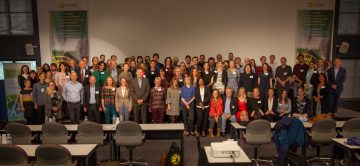
SATORI has released a press kit for general use
